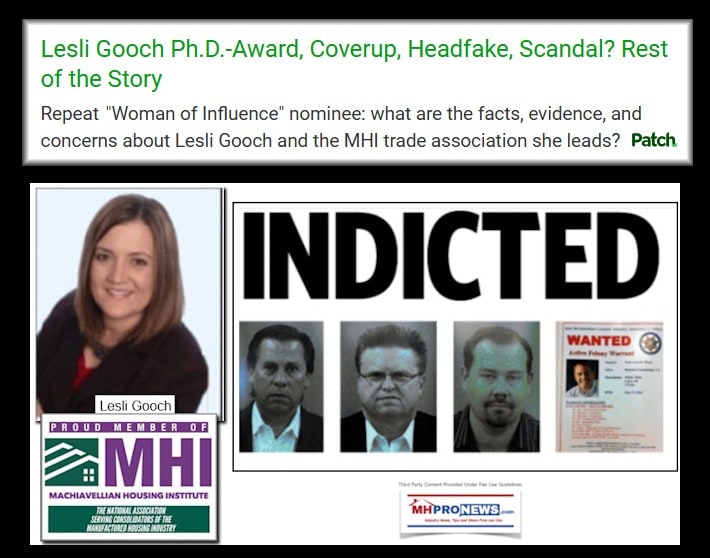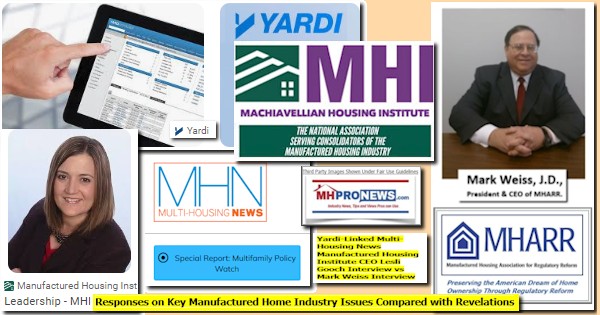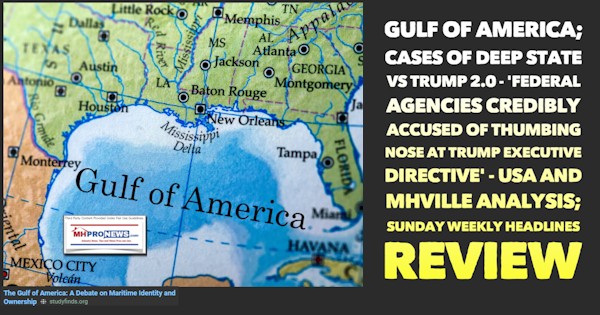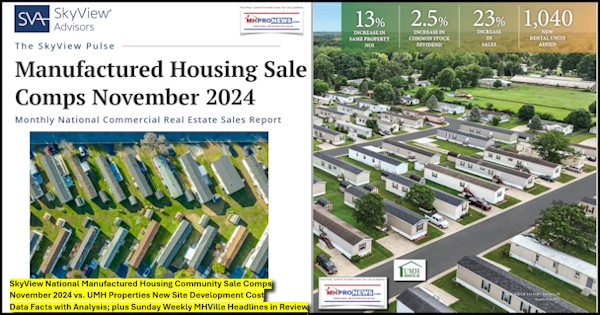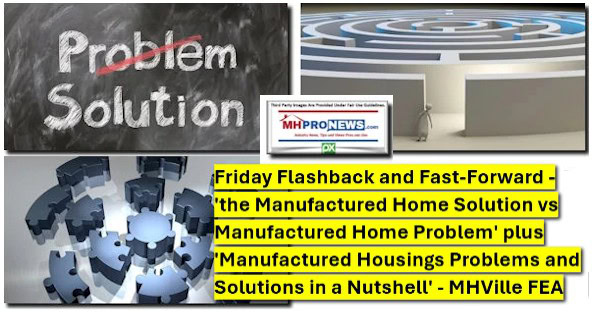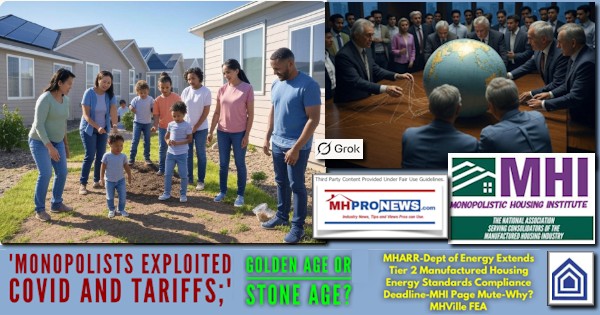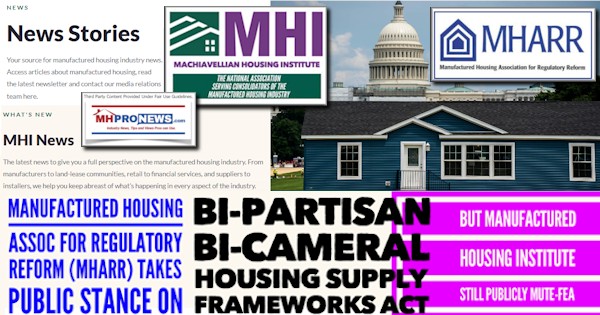
On the Pacific Legal Foundation (PLF) website on this date there are pages of articles related to manufactured homes and manufactured housing. Among them are several articles specifically focused on the George Sheetz vs. County of El Dorado case that was taken all the way to the Supreme Court of the United States (SCOTUS) for adjudication. Sheetz is a manufactured homeowner. He wanted to fight the excessive fees that the county wanted for the placement of manufactured homes. Put differently, this is a topic that ought to be of interest to “all segments” of the manufactured housing industry. Because of the insights from the National Association of Home Builders (NAHB) and their annual “priced out” survey, the sheer size of the “impact” fee that El Dorado wanted to charge Sheetz represents potentially hundreds of thousands of manufactured home buyers that might be pushed out of qualifying for financing if money is tight for buyers, as is so often the case. What did MHI do on this case brought by PLF? Let’s look, starting with several items from PLF, and then pivoting to what MHI said and did. Facts-evidence-analysis (FEA) follows.
Part I – From Pacific Legal Foundation (PLF) at this link here
Protecting the Right to Build
America needs more housing: People across the country are struggling to find affordable places to live. The good news? Property owners want to build more housing. Homeowners want to build accessory dwelling units; landowners want to build new homes; and developers want to build apartment buildings. The bad news? Land use regulation is preventing them—causing the housing crisis.
The right to make productive use of your own property is a fundamental right. Since before the founding, Americans have shaped their destinies out of the land, raising homes and new communities from dirt. For the country to keep growing, and for the individual pursuit of happiness to flourish, we need to keep building.
But the government is now abusing its power to restrict the freedom to build. Zoning—which is meant to enhance public health, welfare, and safety—is instead used to preserve the status quo. Permit fees and exactions—meant to compensate for the actual public impacts of construction—are imposed arbitrarily, distorting the housing market and pushing the cost of housing to crippling levels.

“PLF is fighting to dismantle unreasonable government restrictions on building.”
Further down on the same PLF page was this.
Of Note
Supreme Court rules against extortionate permit fees
On April 12, 2024, the Supreme Court ruled unanimously for California homeowner George Sheetz in a case about development “impact fees.” George sued his county after it forced him to pay a $23,420 traffic impact fee in order to get a building permit. The high fee was especially absurd in George’s case: He was only trying to build a modest, manufactured home. With the help of Pacific Legal Foundation and former PLF attorney Paul Beard, George won a unanimous decision at the Supreme Court, which affirmed permit fees like George’s must be related and proportional to the building project.
Part II From the Pacific Legal Foundation (PLF) at this link here
The American dream is built on property rights- why have we forgotten that?
Several years ago, an author defended looting in an NPR interview by arguing, “It’s just property. It’s not actually hurting any people.” That justification stayed with me. How many Americans have forgotten that private property is how human beings implement their freedom in the world?
Liberty is not just the freedom to think but also to do – to pursue happiness through the fruits of your own labor. The ability to acquire and use property is the source of personal independence. It’s how men and women exercise the power to shape their lives.
When Patrick Henry said, “Give me liberty, or give me death!” he and other American revolutionaries understood that liberty requires security in your person and property. They believed, as Thomas Jefferson would later put it, that a right to property is founded in our natural wants, in the means with which we are endowed to satisfy these wants, and the right to what we acquire by those means without violating the similar rights of other sensible beings; that no one has a right to obstruct another…
And yet, despite the property protections written into the Constitution, Americans have allowed property rights to fall to second-class status – perhaps believing no one is truly “hurt” by the loss of property.
In my two decades in public interest law, I’ve met homeowners, business owners, farmers, ranchers, and countless others who were hurt when the government prevented them from using their own property. For each, the loss was a loss of liberty.
Take California homeowner George Sheetz. When he applied for a permit to install a manufactured home on his empty land, El Dorado County imposed an exorbitant $23,420 “impact fee.” George, in his sixties, had spent decades working his way up from a $5-an-hour laborer to the head of his own contracting company. It had taken him three years to pay off his land. The house he was trying to build wasn’t just a house – it never is – but a new home where he and his wife planned to raise their grandson. By making it difficult for George to build on his own land, El Dorado County was violating his right to shape his own life. (The Supreme Court unanimously ruled for George in an initial win that holds legislative exactions to the same constitutional standard as administrative exactions. George’s case now continues in the trial court.)
Or take property owners who’ve been forced to host unwanted tenants and squatters – people like John Williams, a Bay Area duplex owner who struggled for years with a non-paying tenant after Alameda County imposed an eviction moratorium during the COVID-19 pandemic. The moratorium lasted three years, and John – whose entire life savings were wrapped up in the duplex and who hoped to leave the Bay Area – was trapped.
Even restrictions that seem small can have huge consequences for families. Accessory dwelling units (ADUs) are small, independent structures added to residential properties. Sometimes called “granny flats,” ADUs can be life-changing for a family: They can allow a child to grow up with a grandparent living next door. But the government routinely makes it difficult for homeowners to build. Steve and Karen Reinecke, a Laguna Beach couple, are suing the California Coastal Commission after it blocked their ADU plans. At stake is not just the small structure they wish to build, but the future they envision for their family. In his speech 250 years ago, Patrick Henry said, “I have but one lamp by which my feet are guided, and that is the lamp of experience. I know of no way of judging of the future but by the past.” The past of this country shows property rights are the foundation of individual liberty. My own experience with clients suggests the government has become far too willing to infringe on people’s ability to acquire and use property – forgetting, perhaps, the real cost to people’s freedom and flourishing.
—
This op-ed originally appeared in the Daily Journal on March 24, 2025.
—
Part III from the PLF website at this link here is the following on the Sheetz vs. County of El Dorado SCOTUS case
Supreme Court rules against extortionate permit fees
Sheetz v. County of El Dorado
CASE RESOURCES
- Development impact fees: Frequently asked questions
- Photo gallery
- Learn about Nollan v. California Coastal Commission, PLF’s first Supreme Court win
CASE STORY
George Sheetz built a career and livelihood as an engineering contractor and consultant in Northern California. In 2016, he began preparing for retirement and bought a vacant lot in rural El Dorado County for a small, manufactured home where he and his wife would live and raise their grandson.
He got his home, but it came with permit fees so exorbitant, he made a federal case out of it—a case that went the Supreme Court of the United States.
George knows the ropes and red tape involved in new construction, and he figured the process would be easier for a manufactured home because it’s already built and had passed necessary government inspections.
Once his land was ready and all George needed was a county building permit, he was stunned when told he could have his permit, but only if he paid a so-called traffic impact fee of more than $23,000.
The County claimed it was bound by law to charge the fee for roadwork his project might cause, although it provided no evidence tying any future roadwork to any public cost or impact imposed by George’s project.
The government’s fee was nothing more than an exorbitant ransom to pay for permission to build a small, manufactured home. It unfairly imposed costs that had nothing to do with his project.
George weighed the immense cost against the hard work he put into his land and his yearning for a retirement home, and he paid the fee under protest. The County ignored his protest, so George sued, arguing the fees constituted an unconstitutional permit condition under three Supreme Court decisions—including two PLF victories.
The Supreme Court’s 1987 decision in Nollan v. California Coastal Commission struck down certain government demands for land in exchange for a permit as “out-and-out plan of extortion.” The ruling, PLF’s first Supreme Court win, determined that all permit conditions imposed on land development must relate to actual harm caused by the development. The Court expanded Nollan’s scope in 1994, ruling in Dolan v. City of Tigard that government demands must be sufficiently proportional to the actual impacts of the proposed use.
Then in 2013, the Court extended the precedents set in both Nollan and Dolan to permit fees in another PLF case, Koontz v. St. Johns River Water Management District. That is, the government cannot weaponize the permitting process to extort more land or money from property owners than is appropriate.
As powerful as the precedent trio has been in curbing unconstitutional permitting conditions, however, some lower courts found a legal loophole for state and local governments. Rather than focusing on the legal doctrine established by Nollan, Dolan, and Koontz, some courts focused on the fact that the permit conditions at issue in those cases were ultimately imposed by bureaucrats as part of a permit review process. Those courts, which include the California courts, adopted a rule that limited the nexus and proportionality tests to conditions imposed administratively—exempting legislative demands from the constitutional doctrine. That loophole is critical because El Dorado County imposed its permit fees legislatively, as part of a countywide land use overhaul adopted in 2004.
Supreme Court precedent recognizes that, while local governments can charge fees to mitigate for actual public impacts caused by a private project, demanding property in an amount that goes above and beyond that mitigation standard is a taking. This is true whether imposed by bureaucrats or lawmakers, but until George brought his case, the Supreme Court had yet to say so.
On April 12, 2024, the Supreme Court unanimously ruled in George’s favor. “[T]here is no basis for affording property rights less protection in the hands of legislators than administrators,” Justice Amy Coney Barrett wrote in the decision. “The Takings Clause applies equally to both—which means that it prohibits legislatures and agencies alike from imposing unconstitutional conditions on land-use permits.”
Sheetz v. El Dorado County was originally filed and litigated by former PLF attorney Paul Beard II, who successfully argued Koontz. Paul is now a partner at Pierson Ferdinand and argued the case at the Supreme Court, with PLF attorneys as co-counsel.
What’s At Stake?
- The government can’t hold the right to use your property hostage in order to extract exorbitant fees. That’s akin to extortion.
- Permit fees must be proportional to the public costs imposed by new development. Otherwise, the government may leverage the permit process to take property it is not entitled to, skirting the Constitution’s Fifth Amendment prohibition against taking private property without just compensation.
- Singling out some property owners to pay a disproportionate share of the cost of public amenities that are used by everyone is unfair, and the Supreme Court has repeatedly said it’s unconstitutional.
- California’s and some other courts have evaded Supreme Court precedent by allowing legislative bodies, like city councils, to charge excessive permit fees that would be plainly unconstitutional if charged by land use bureaucrats. We’re asking the Supreme Court to reaffirm that property rights don’t get less protection depending on which branch of government violates them.
Case Timeline
April 12, 2024
Opinion
December 29, 2023
Reply Merits Brief
November 13, 2023
Petitioner Opening Brief
May 23, 2023
Petition for Writ of Certiorari
October 19, 2022
Opinion
U.S. Supreme Court Decision in Scheetz vs. County of El Dorado case is linked here.
About Pacific Legal Foundation
Pacific Legal Foundation is a national nonprofit law firm that defends Americans threatened by government overreach and abuse. Since our founding in 1973, we challenge the government when it violates individual liberty and constitutional rights. With active cases in 34 states plus Washington, D.C., PLF represents clients in state and federal courts, with 18 wins of 20 cases litigated at the U.S. Supreme Court.
Part IV – Additional Information with More MHProNews Analysis and Commentary
In no particular order of importance are the following.
1) MHProNews has previously reported on – or made reference to – this Sheetz case. See the report, for a good example, linked below.
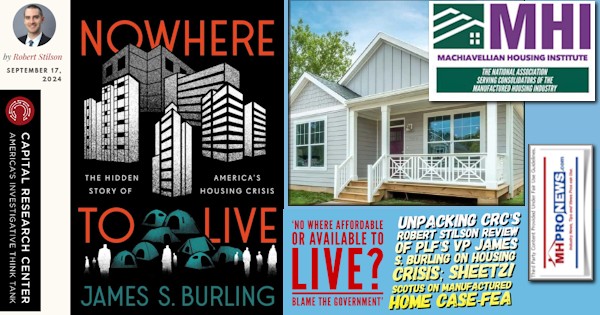
2) The Manufactured Housing Institute (MHI) website’s news segments say the following. From their home page news section.
Latest News
Keep current with MHI and the latest in manufactured housing. Browse the latest industry news.
Or from their news landing page is this.

3) How about using MHI’s own site search tool? On 4.2.2025 are these two searches. So, almost a year after the Supreme Court of the United States (SCOTUS), MHI has nothing. Nada. Zip. So much for MHI’s home page claim.
Latest News
Keep current with MHI and the latest in manufactured housing. Browse the latest industry news.
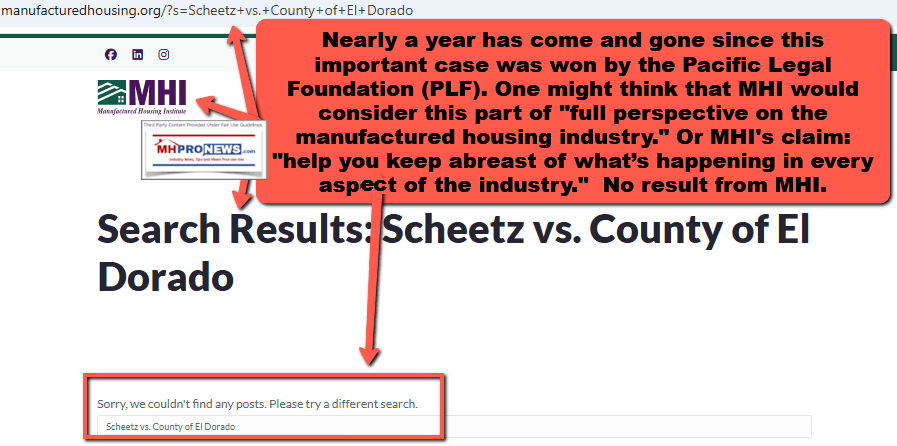
4) Or from the MHI News Landing page, where MHI said this.
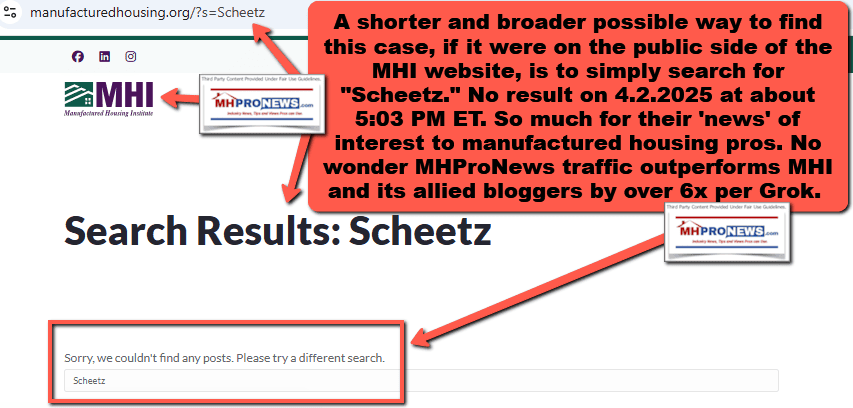
6) What is that called? Gaslighting? Lying? Head-fake? Paltering and preening? Reporting in a style borrowed straight out of the pages of George Orwell’s dystopian novel, 1984? Because a U.S. Supreme Court case IS big news. Pacific Legal Foundation (PLF) found it important enough to run follow ups on it a year after their ruling. But what is it that MHI has had on their home page and news landing page instead?
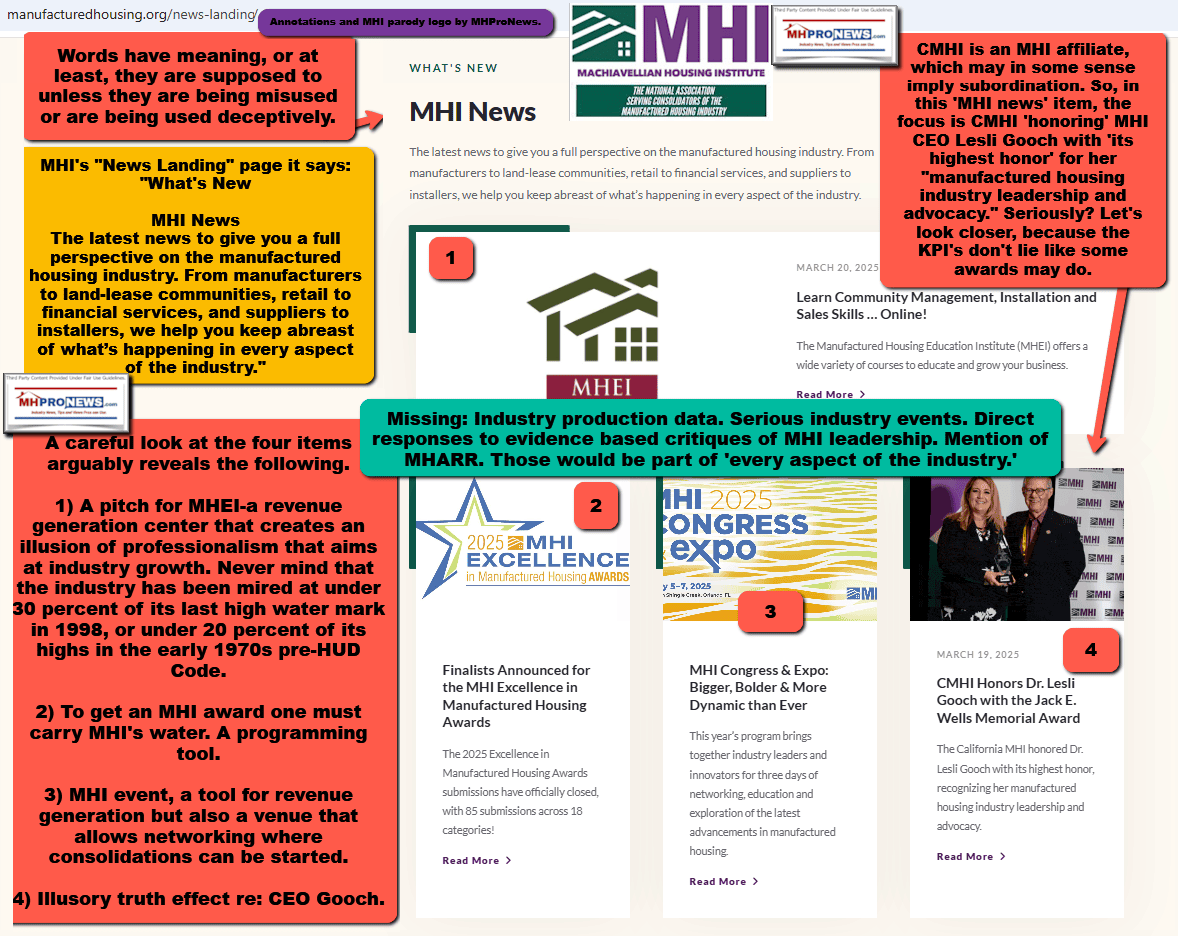
It is all about themselves.
7) MHI might as well be following the lead of their “member emeritus” and allied blogger, George Allen. A former Allen client, a high ranking official at a firm who is a long time and well known MHI member told MHProNews this. “With George, it is AAA. All About Allen.”
Be that as it may, with MHI, it seems that it is all about MHI members and MHI itself. Now, look again at the definition of news. Per Oxford Languages, “news: means this.
noun
8) Speaking of MHI blogger Allen. What did he say about this overwhelming unanimous PLF legal victory before the U.S. Supreme Court in the Sheetz vs. El Dorado case?

9) Given sentence after sentence of Allen praising himself, kind of embarrassing, isn’t it? The latest tweak on Allen’s line after line, paragraph after paragraph, of straining his arm to pat his own back reads like this. Quoting Allen about Allen and his Community-Investors/EducateMHC website.
Know this! HUD-Code manufactured housing (‘MH’) is federally-regulated, performance-based, affordable-attainable, factory-built housing (a.k.a. offsite construction), contrasted with traditional stick-built housing (a.k.a. onsite construction). Then, land lease communities (a.k.a. manufactured home communities & ‘mobile home parks’) comprise the commercial real estate (‘CRE’) component of MH. And considering various types of housing finance (e.g. chattel or ‘home only’ loans & real estate-secured mortgages) describes post-production segment of MH.
EducateMHC is the official MH historian, trade term & trend tracker, as well as perennial MH information source. Contact EducateMHC via (317881-3815; email: gfa7156@aol.com, and www.educatemhc.com, to purchase Community Management in the Manufactured Housing Industry (Should be in every land lease community office nationwide!), and SWAN SONG – History of land lease communities & official record of annual MH production since 1955.
And my autobiography, From SmittyAlpha6 to MHMaven, describes personal combat adventures in Vietnam as a USMC lieutenant, a 45 year entrepreneur business career in MH & community ownership, as well as freelance consulting and authoring of nonfiction texts.
George Allen is the sole emeritus member of the Manufactured Housing Institute (‘MHI’), a founding board member of MHI’s National Communities Council (‘NCC’) division, RV/MH Hall of Fame enshrinee, the Allen Legacy columnist and editor at large for MHInsider magazine.
It sounds so impressive. Until it is actually tested by an actual manufactured housing industry news item. By the way, as believers in a free press and free speech, MHProNews believes it is their God-given and constitutionally protected right to be this wrong. But let’s press on, because in fairness, it isn’t just MHI or Allen who missed this important topic.
10) This is what a Google search under the “all” tab revealed at the date and time shown in the annotated screen capture shown below.

But if someone goes beyond that part of the Google search result, this is what the page 1 result reveals.
There are MHProNews fact-checks that specifically mentioned the various MHI-linked bloggers and trade media by name. But because they had nothing (apparently then or now), it is MHProNews that is shown in the search result, and not them.

11) What about routine commentator Frank Rolfe, who along with his partner Dave Reynolds, are prominent and notorious MHI members who blog about issues of interest about “mobile home parks” (SIC) or the manufactured home industry?

12) At least on this date, MHI linked publisher Kurt Kelley’s MHReview doesn’t keep their content on a website, because they email a link to their quarterly PDF publication, so a search for that is fairly useless. Emails don’t normally appear in online searches. But what about MHI award winner ManufacturedHomes.com and their ‘news’ blog that boldly claims to be a definitive source for information about manufactured housing? Once again, nothing. See that evidence below. What do you call those so-called news and information sources that fail to mention a unanimous Supreme Court decision involving manufactured housing, even a year after the ruling was handed down?

Again, to be clear, MHProNews defends their God-given and constitutionally protected right to be wrong by not publishing on such significant items. While that perhaps helps explain why MHProNews dominates in industry news, per multiple AI based fact checks based upon known evidence. When people want information, who else can they turn to in news publishing in MHVille? Note that all of those publishers and MHI are per sources deemed reliable routine readers of MHProNews. They also get asked directly by MHProNews from time to time to comment on specific issues. So, as xAI’s Grok noted (see specific quotes and data below), MHProNews reportedly has well over 6x the combined traffic of all of those MHI and MHI-linked bloggers/trade media combined.

Fact and evidence checks like this one on the Sheetz case are done for several good reasons. While it may indeed spotlight news and views covered by MHProNews and/or MHLivingNews that are not covered by our self-praising rivals, or at times perhaps worse, when those wannabe rivals’ mis-inform their readers on this or that issue.
There is an obvious and deeper takeaway on this Sheetz vs. El Dorado case. See that deeper takeaway below. See what artificial intelligence (AI) has to say in this series of Q&As.
13) MHProNews asks the questions posed to Copilot that follow. The response is by Bing‘s AI powered Copilot. Keep in mind that Bing and Copilot are Microsoft products. Microsoft is obviously linked cofounder with William “Bill” Gates III. Gates is a longtime ally of Warren Buffett. The Gates Foundation, and Gates’ investment fund, are sizable holders of Buffett-led Berkshire Hathaway (BRK) stock. Berkshire is the owner of Clayton Homes, 21st Mortgage, Vanderbilt Mortage and Finance, Shaw, and other firms that are involved in a significant way in manufactured housing and at MHI. So, one should not be surprised if a bias exists in favor of Berkshire’s interests. Bill Gates served on Berkshire’s board for years, and Buffett served on the Gates Foundation as a trustee for years.
Copilot, new topic. Can you find any evidence that the Manufactured Housing Institute filed an amicus brief or otherwise took action in support of the Sheetz vs. County of El Dorado case before the Supreme Court of the United States (SCOTUS)? Link results.

If you’d like, I can help explore related legal actions or industry responses to this case!
1www.supremecourt.gov 2manhattan.institute
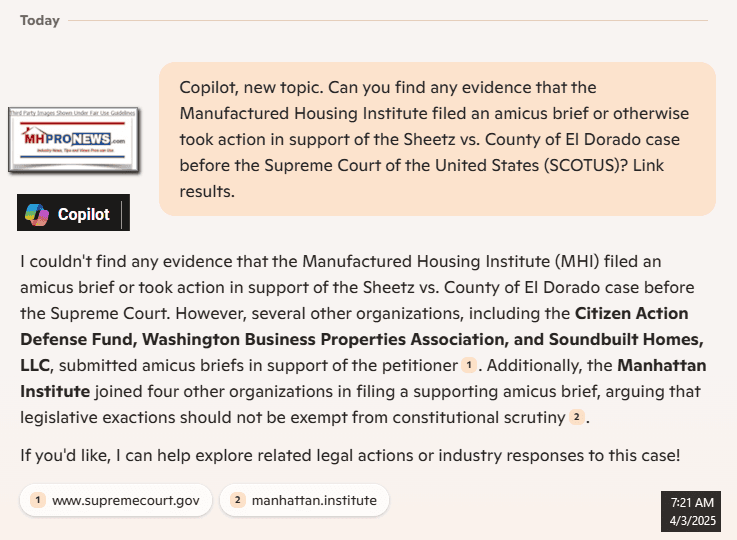
14) The above tees up the follow up by MHProNews below.
Ok, that was my understanding too, that the Manufactured Housing Institute failed to file an amicus brief in the George Sheetz vs County of El Dorado case. At the heart of that case was Sheetz’s desire to buy a manufactured home for his property and to be able to do so without a hefty impact fee that might cause numbers of people of modest means to not buy a manufactured home, is that a reasonable and fair viewpoint for that case? So, given that the Institute claims to represent all segments of the industry, they should have filed an amicus brief, correct? Couldn’t the Institute have mentioned the Manufactured Housing Improvement Act of 2000 in such a brief and its enhanced preemption provision as part of a potential amicus brief? Has the Manufactured Housing Institute, or their related bloggers or trade media, even mentioned this case on their own websites? Has anyone other than MHProNews involved in manufactured home industry trade media mentioned the Sheetz case?

Given that the Manufactured Housing Institute (MHI) claims to represent all segments of the industry, it would have been logical for them to file an amicus brief in support of Sheetz, particularly since the case directly impacted manufactured housing affordability and accessibility. The Manufactured Housing Improvement Act of 2000 (MHIA) and its enhanced preemption provision could have been relevant arguments in such a brief, as they emphasize federal protections for manufactured housing against restrictive local regulations.
Regarding MHI’s involvement, I couldn’t find any evidence that the Manufactured Housing Institute or its affiliated bloggers or trade media have mentioned the Sheetz case on their own websites. However, other organizations, such as the Housing Affordability Institute, Pacific Legal Foundation, and SCOTUSblog, have covered the case extensively.
MHProNews appears to be the only manufactured home industry trade media outlet that has actively reported on the Sheetz case. If you’d like, I can help explore further details or related industry responses!
1www.housingaffordabilityinstitute.org 2pacificlegal.org 3www.scotusblog.com 4www.govtrack.us 5www.hud.gov 6uscode.house.gov
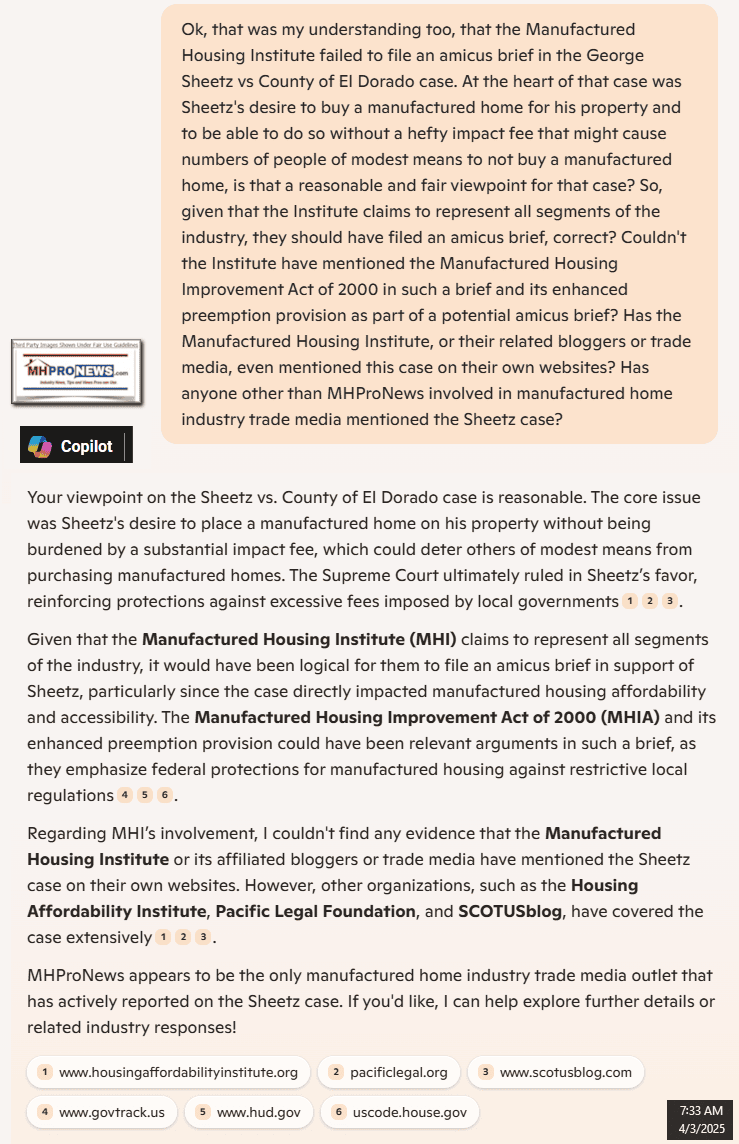
There is more to know on this topic. Let’s note that the Manufactured Housing Association for Regulatory Reform (MHARR) is a production-focused trade group, and this is a post-production issue.
A follow up to this topic is planned in the near term. Watch for it. ###



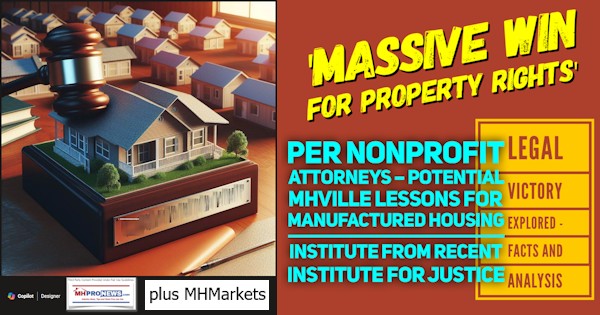





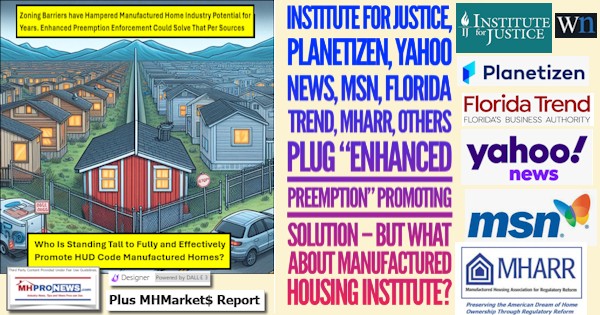


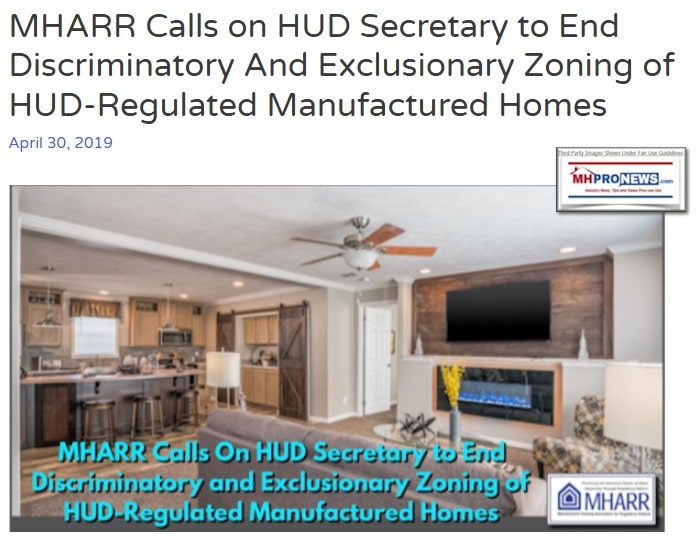

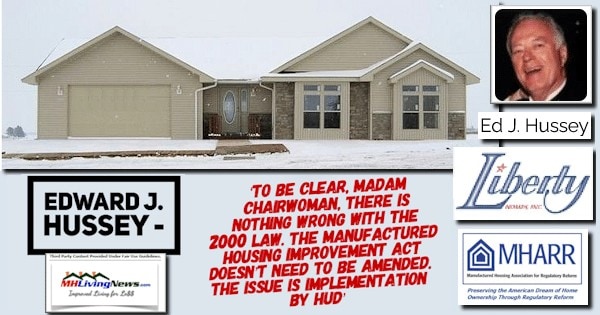
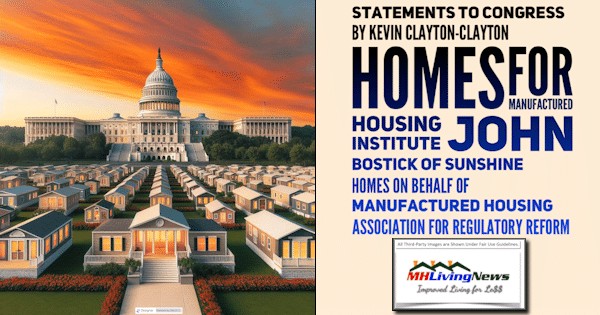

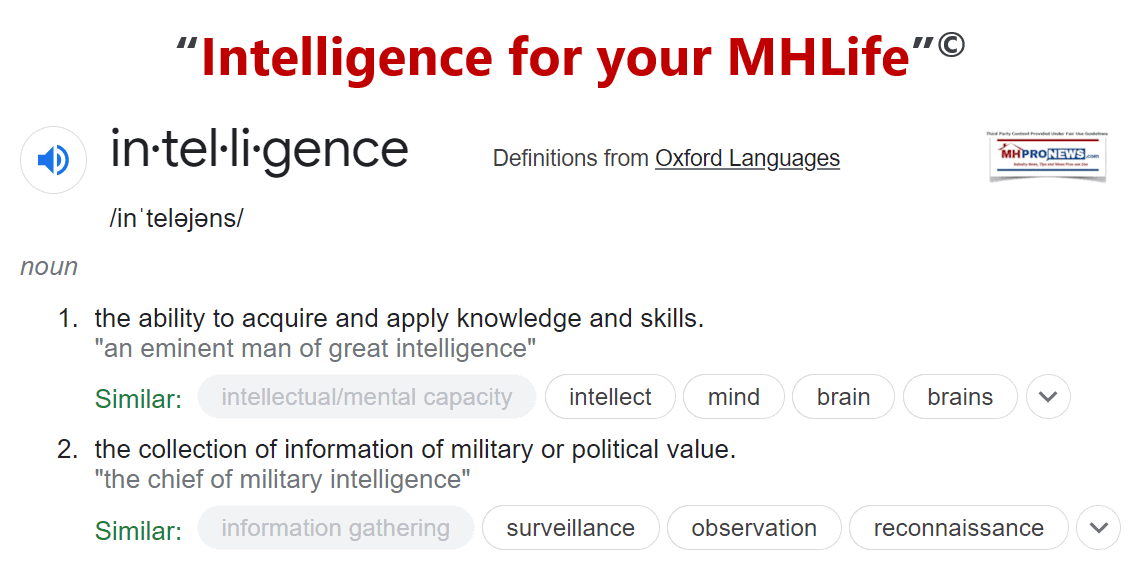
“Don’t Just Trust Us, Check Us.” ©
“We Provide, You Decide.” ©
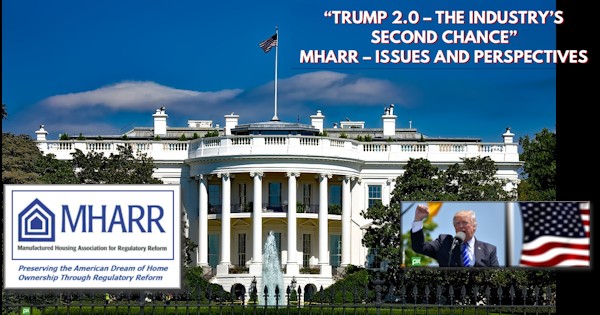

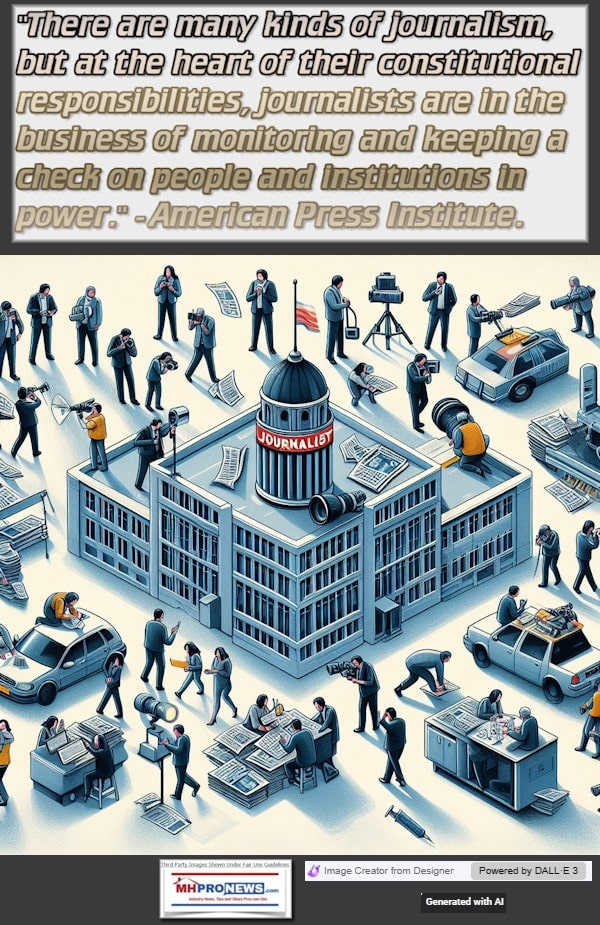


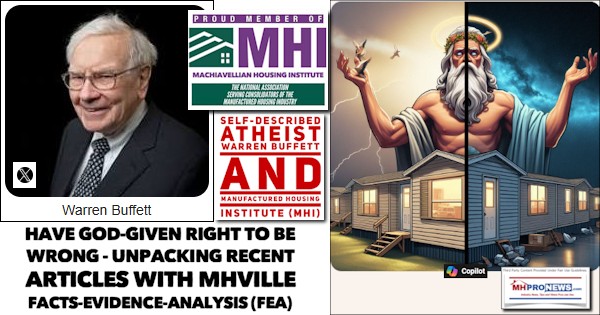

Again, our thanks to free email subscribers and all readers like you, as well as our tipsters/sources, sponsors and God for making and keeping us the runaway number one source for authentic “News through the lens of manufactured homes and factory-built housing” © where “We Provide, You Decide.” © ## (Affordable housing, manufactured homes, reports, fact-checks, analysis, and commentary. Third-party images or content are provided under fair use guidelines for media.) See Related Reports, further below. Text/image boxes often are hot-linked to other reports that can be access by clicking on them.)

By L.A. “Tony” Kovach – for MHProNews.com.
Tony earned a journalism scholarship and earned numerous awards in history and in manufactured housing.
For example, he earned the prestigious Lottinville Award in history from the University of Oklahoma, where he studied history and business management. He’s a managing member and co-founder of LifeStyle Factory Homes, LLC, the parent company to MHProNews, and MHLivingNews.com.
This article reflects the LLC’s and/or the writer’s position and may or may not reflect the views of sponsors or supporters.
Connect on LinkedIn: http://www.linkedin.com/in/latonykovach
Related References:
The text/image boxes below are linked to other reports, which can be accessed by clicking on them.’
